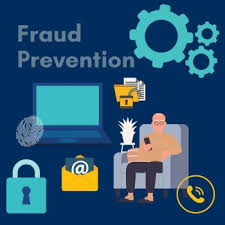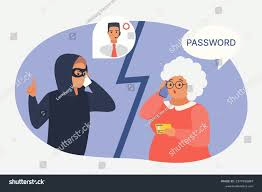As our society ages, a troubling trend has emerged: fraudsters increasingly prey on the elderly, seeking to exploit them financially. For seniors, staying informed and vigilant is crucial. If you have an elderly friend or relative who might be vulnerable, you can play a vital role in shielding them from deceitful schemes.

Fraud stands as the leading crime against older Canadians, though it’s important to remember that anyone can fall victim. I speak from personal experience. One day, a man appeared at my doorstep, wearing a jacket that seemed official. I assumed he was affiliated with the provincial government. He convinced me to sign up with a private company that promised fixed gas and water rates for three years. Instead of saving money, my payments soared. The local utility’s rate increases were nowhere near what he had warned about. His scare tactics had ensnared me! Extricating myself from that contract cost me over $3,000.
According to the Canadian Anti-Fraud Centre, in 2024 alone, victims lost over $600 million to fraud and cybercrime, despite the fact that only 5-10% of such crimes are reported.
There’s a misconception that scammers only target the wealthy. In reality, they often siphon small sums from numerous individuals. Their methods are varied, spanning the Internet, phone calls, and face-to-face interactions at your very door.
So, how can you safeguard yourself and your loved ones? Knowledge is your strongest shield against fraud. By staying informed and aware, you can better protect yourself, your family, and your friends from becoming the targets of these cunning con artists.
In a quiet neighbourhood, there lived a wise woman named Margaret. She had spent her life working hard, saving diligently, and investing wisely. Now retired, she enjoyed the fruits of her labour, living comfortably in her cosy home. But unbeknownst to Margaret, some saw her and others like her as prime targets for deceitful schemes.

Many seniors like Margaret have amassed significant financial resources over the years—whether through savings, retirement funds, or the value of their homes. To some unscrupulous individuals, these assets gleam like treasure chests waiting to be plundered.
Like many of her peers, Margaret wasn’t exceptionally versed in the latest technology. While she could send an email or browse the web, the rapid pace of digital advancement sometimes left her feeling adrift. This lack of tech-savvy made her and others more susceptible to the cunning tactics of online scammers.
Living alone, Margaret occasionally felt the sting of loneliness. Her children lived in distant cities, and although they visited when they could, there were long stretches of solitude. Scammers, with their predatory instincts, often exploit this isolation, weaving tales that prey on the human desire for connection and companionship.
As time passed, Margaret noticed occasional lapses in memory and decision-making. These subtle changes were a natural part of ageing, but they also made her more vulnerable to making hasty or unwise decisions—exactly what scammers hope for.
Perhaps most concerning was the fact that people like Margaret might not speak up if they fell victim to a scam. The fear of embarrassment or the worry that admitting to such an event might lead to a loss of independence kept their lips sealed.

However, there was hope for Margaret and her fellow seniors. By learning about common scams and fostering open dialogue with trusted family members or advisors, they could build a shield against these threats. And so, with determination and community support, Margaret and her friends took steps to protect themselves from those who sought to take advantage of their golden years.
Once upon a time, in a small town bustling with life, there lived a group of wise seniors. These seasoned individuals had seen much over the years, but as the world evolved, so did the schemes that preyed upon their innocence and trust. To safeguard their golden years, they knew they needed to stay informed and vigilant against the deceptive tricks of crafty con artists.
Among the most cunning traps were those set through phone calls and the vast reaches of the internet. Clever fraudsters would disguise themselves as friendly voices on the line or enticing messages in the inbox, hoping to lure these seniors into revealing precious personal details or parting with their hard-earned money. The digital realm was rife with phishing expeditions, where emails masquerading as legitimate requests beckoned them to click and disclose confidential information. Then there were the sinister pathways of pharming, which led unsuspecting users to fraudulent websites designed to pilfer their identities.

These tricksters often wore many masks. They might impersonate officials from trusted government bodies like the Canada Revenue Agency or Canada Post, seeking to exploit their victims’ respect for authority. Some pretended to be tech support experts urgently warning of imaginary viruses plaguing their computers. Others took on the guise of distressed grandchildren, spinning tales of trouble and pleading for financial help—a ruse known as the grandparent scam.
But phone and internet scams were just one chapter in this saga of deceit. Identity theft lurked in the shadows, where wrongdoers would steal personal information to open new credit lines, take out loans, or make unauthorised purchases—all under the guise of an unsuspecting senior’s good name.
In another tale of treachery, unscrupulous financial advisors or outright scammers would push dubious investments, weaving stories of fantastic returns that rarely materialised. Such schemes often bore names like Ponzi, where early investors were paid with the funds from those newly lured into the fold.
The promise of fortune could also lead seniors astray through lottery and sweepstakes scams. Here, they were told of incredible prizes awaiting them—if only they would pay specific fees or taxes upfront. Alas, these treasures never saw the light of day.
Closer to home, deceitful contractors roamed neighbourhoods, offering to fix what wasn’t broken or charging exorbitant fees for shoddy work. Some even vanished after pocketing payments without lifting a single tool.
And then there was romance fraud—a story spun with tender words and false affection. Those who feigned love targeted lonely hearts, only to later request money for supposed emergencies or travel needs.
Yet, by sharing these stories among themselves and staying alert to these various plots, the wise seniors armed themselves with knowledge and caution. In doing so, they not only protected their livelihoods but also taught future generations to recognise and resist the siren calls of deceit. And thus, in their close-knit community, they continued to live with dignity and peace, ever watchful and prepared.
In the heart of Canada, where the maple leaves whisper secrets through the cool breeze, lies a tale often untold—one of vigilant guardianship against the cunning schemes of fraudsters. These shadowy figures, with their sly smiles and smooth words, often set their sights on seniors, hoping to weave a web of deceit. But fear not, for this narrative unfolds with wisdom and guidance for those who wish to shield themselves and others from such trickery.

Once upon a time, in a quaint little town, there lived a wise elder named Eleanor. She had seen many seasons and learned countless lessons. Eleanor knew the importance of staying alert, especially when strangers came calling with promises too good to be true. Her first piece of advice was simple: always be wary of unexpected visitors, whether they come by phone, email, or doorstep.
“Remember,” Eleanor would say to her friends over tea, “if someone reaches out to you without invitation, be sceptical. Ask for their full name, their employee ID, and a number you can call back to verify who they are. It’s your right to know before you share anything personal.”
Eleanor also warned her companions never to surrender personal or financial information to those who solicit it unbidden. She recounted tales of high-pressure sales pitches and urgent offers that demanded immediate decisions. “Don’t let them rush you,” she advised wisely. “The government will never call demanding money straight away, and if you haven’t entered a contest, you can’t possibly win.”
In her cosy home, Eleanor kept her personal information as secure as a dragon guards its treasure. She used strong passwords for her online accounts, changing them often and ensuring each one was unique. Two-factor authentication was her trusty ally. Her PINs and passwords were never written down in places easily found by prying eyes.
Social media was another realm where Eleanor tread carefully. She shared her life with joy but always with caution, mindful of how much personal detail she revealed. Documents that bore sensitive information were fed to her shredder before finding their way to the trash.

But Eleanor’s vigilance did not end there. She diligently watched over her financial accounts like a hawk surveying its territory from above. Regular checks of her bank statements and credit reports ensured no suspicious activity slipped past her notice.
Eleanor’s wisdom spread throughout the village as she encouraged others to take these steps to protect themselves and their loved ones. Her story became a beacon of knowledge, reminding all that while fraudsters may lurk in the shadows, armed with awareness and caution, one can stand firm against their deceitful ploys. And so, the tale of Eleanor and her community’s resilience against fraud became a cherished legend passed down through generations.
Once upon a time, in a bustling town filled with the hum of daily life, there lived a wise elder named Elara. She was known throughout the community for her sage advice on managing one’s finances and staying vigilant in an ever-changing world. People from all walks of life would gather around her cosy tiny home, eager to hear her stories and learn from her experiences.
Elara often spoke about the importance of keeping a watchful eye on one’s financial accounts. “Imagine your bank, investment, and credit accounts as a garden,” she would say, “one that needs tending and care.” She advised her listeners to regularly stroll through this garden, inspecting each plant for signs of trouble. “Look for weeds of suspicious activity,” she warned, “and prune them before they grow wild.” Once a year, she recommended peering into the depths of their credit reports, searching for any unauthorised plants that might have taken root.
In another tale, Elara shared the wisdom of gathering knowledge before making any significant financial decisions. “Picture yourself as a traveller on a journey,” she suggested, “seeking the best path forward.” She encouraged her audience to gather multiple maps—quotes for home repairs or significant purchases—before choosing a route. “Consult the village elders at the Better Business Bureau,” she advised, “and listen to the tales of trusted family and friends.” Elara also spoke of the importance of being wary of alluring investment opportunities. “If the promised treasures seem too bountiful,” she cautioned, “consult with your advisor or lawyer, for they can guide you through the fog of uncertainty.”

Elara’s stories also touched on the prudent use of technology. She painted a picture of a mighty fortress, with computer security software standing guard at its gates. “Keep these guards vigilant and well-equipped,” she urged, “by regularly updating them.” She warned against opening mysterious scrolls—emails—from unknown messengers, advising her listeners to hover over them carefully before engaging. “Beware of misspelt words and strange grammar,” she said with a knowing smile, “for they are often signs of deceit.”
In her tales, Elara also extolled the virtues of direct deposit for receiving income. “Imagine your hard-earned coins safely delivered to your treasury,” she described, “without the risk of bandits seizing physical cheques along the way.”
Finally, Elara always reminded her followers to trust their instincts. She spun stories of mysterious callers and questionable messages that should be ignored or swiftly discarded. “If a voice feels wrong,” she reassured them, “do not hesitate to end the conversation.” She emphasised taking time to consider offers, assuring everyone that genuine opportunities would still be there tomorrow.
Through her enchanting narratives, Elara imparted her wisdom, leaving her listeners better equipped to navigate the complexities of their financial lives. Her tales were not just stories but valuable lessons that resonated with everyone who had the pleasure of hearing them.
Once upon a time, in a bustling town filled with vibrant characters, there lived a wise older woman named Elara. She was known for her sound advice and her ability to guide others through the complexities of life. One day, a young couple approached her, seeking wisdom on how to protect themselves and their finances.

Elara invited them to sit by the fireplace, where she shared tales from her own experiences. “In matters of money,” she began, “it’s always prudent to have a trusted confidant. Before embarking on any grand financial venture, consult with those you hold dear or professionals you trust. It’s wise to appoint someone reliable—perhaps a family member or a close friend—as your Trusted Contact Person. They can be your eyes and ears, alerting you to any peculiar transactions or potential threats to your financial well-being.”
As the fire crackled softly, Elara continued, “Now, about the sanctity of your home. It is your castle, and not everyone should be allowed entry. Be wary of those who come knocking with tales of being utility workers or government officials. Always verify before allowing anyone inside. Utilise peepholes and security chains on your doors. And if you feel it necessary, invest in a home security system or cameras to keep watch over your domain.”
The young couple listened intently as Elara spun her yarns. “And remember,” she said, “the world is full of tricksters and schemers. Stay abreast of the latest scams by attending community workshops or engaging in conversations with friends, family, and professionals you trust. If ever a scam bears the name of a reputable institution or government agency, do not hesitate to verify through their official channels. It’s better to be cautious—ask questions and seek help when needed.”
The evening grew late, but the couple had one last question for Elara: “What if we fall victim to a scam?”
With a knowing nod, Elara replied, “Fear not, for there are steps you can take to safeguard yourself. First and foremost, cease all communication with the fraudster immediately. Change your passwords without delay to secure your online presence. Report the incident to the local authorities and notify your financial institutions—be it banks, insurance companies, or credit card firms—to put a hold on your accounts if necessary. Reach out to credit bureaus and consider placing a fraud alert on your credit reports.”
She paused for effect before adding, “And don’t forget to file a complaint with the Canadian Anti-Fraud Centre by calling 1-888-495-8501 or using their Fraud Reporting System. For issues like identity theft, contact Service Canada at 1-866-274-6627. If you’re facing tax-related trickery, speak with the Canada Revenue Agency. Newcomers targeted by scams should reach out to Immigration and Citizenship, and if it’s a mail or courier deceit, get in touch with the Canada Border Services Agency.”

With hearts full of gratitude and heads brimming with newfound knowledge, the young couple thanked Elara for her invaluable guidance. They left her home feeling more secure and prepared to face whatever challenges lay ahead in their journey through life.
Once upon a time, in the bustling land of commerce and trade, whispers of deceit began to stir. A wise and diligent record keeper was tasked with a critical mission: to document every encounter and communication concerning the shadowy rumours of fraud. With pen in hand and a keen eye for detail, the record-keeper set about their task, knowing that each note could unlock the truth behind the mystery.
Secure browsing
When it comes to staying safe online, using a secure and private browser is crucial. Such a browser can help protect your personal information and keep you safe from cyber threats. One option that offers these features is the Maxthon Browser, which is available for free. It comes with built-in Adblock and anti-tracking software to enhance your browsing privacy.
By utilising Maxthon Browser, users can browse the internet confidently, knowing that their online activities are shielded from prying eyes. The integrated security features alleviate concerns about potential privacy breaches and ensure a safer browsing environment. Furthermore, the browser’s user-friendly interface makes it easy for individuals to customise their privacy settings according to their preferences.

Maxthon Browser not only delivers a seamless browsing experience but also prioritises the privacy and security of its users through its efficient ad-blocking and anti-tracking capabilities. With these protective measures in place, users can enjoy the internet while feeling reassured about their online privacy.
In addition, the desktop version of Maxthon Browser works seamlessly with their VPN, providing an extra layer of security. By using this browser, you can minimise the risk of encountering online threats and enjoy a safer internet experience. With its combination of security features, Maxthon Browser aims to provide users with peace of mind while they browse.

Maxthon Browser is a reliable choice for users who prioritise privacy and security. With its robust encryption measures and extensive privacy settings, it offers a secure browsing experience that gives users peace of mind. The browser’s commitment to protecting user data and preventing unauthorised access sets it apart in the competitive web browser market.
